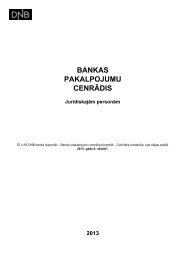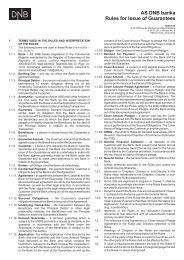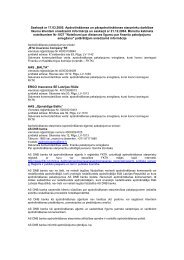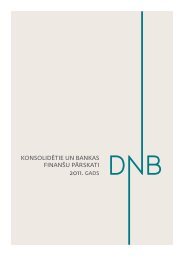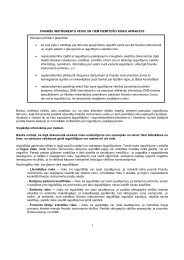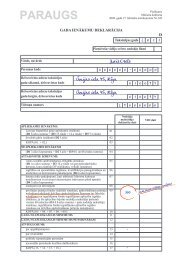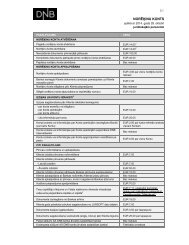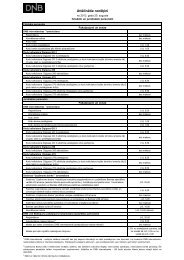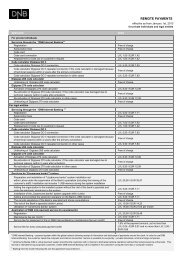Base Prospectus - Malta Financial Services Authority
Base Prospectus - Malta Financial Services Authority
Base Prospectus - Malta Financial Services Authority
Create successful ePaper yourself
Turn your PDF publications into a flip-book with our unique Google optimized e-Paper software.
Note reporting interest income as it is paid may be required to defer a portion of any interest<br />
expense otherwise deductible on indebtedness incurred to purchase or carry the Short-Term Note<br />
until the taxable disposition of the Short-Term Note. A cash basis taxpayer may elect to have<br />
Section 1281 of the Code apply to all of its non-government debt obligations with a term of one<br />
year or less, in which case the taxpayer would include interest on the Short-Term Note in income<br />
as it accrues, but would not be subject to the interest expense deferral rule referred to in the<br />
preceding sentence. Once made, this election applies to all relevant debt obligations held or<br />
subsequently acquired by the electing holder on or after the first day of the first taxable year to<br />
which the election applies and may not be revoked without the consent of the United States<br />
Internal Revenue Service (the ‘‘IRS’’). Certain special rules apply if a Short-Term Note is<br />
purchased for more or less than its principal amount.<br />
OID on a Non-U.S. Dollar Note will be determined for any accrual period in the foreign<br />
currency in which the Note is denominated and then translated into U.S. dollars in the same<br />
manner as interest income accrued by a U.S. Holder on the accrual basis, as described above.<br />
Likewise, a U.S. Holder will recognise foreign currency gain or loss when the OID is paid to the<br />
extent of the difference between the U.S. dollar value of such payment (determined by translating<br />
the foreign currency into U.S. dollars at the spot rate for foreign currency on the date received)<br />
and the U.S. dollar value of the accrued OID included in income.<br />
Certain of the Notes (a) may be redeemable at the option of the Issuer prior to their stated<br />
maturity and/or (b) may be repayable at the option of the Holder prior to their stated maturity.<br />
Notes containing such features may be subject to rules that differ from the general rules discussed<br />
above. Investors intending to purchase Notes with such features should consult their tax advisers,<br />
since the OID consequences will depend, in part, on the particular terms and features of the<br />
purchased Notes.<br />
Amortisable Bond Premium<br />
A U.S. Holder who purchases a Note for an amount in excess of the sum of all amounts<br />
payable on the Note after the purchase date other than qualified stated interest will be considered<br />
to have purchased the Note at a premium and will not be required to include any OID in income. A<br />
U.S. Holder generally may elect to amortise the bond premium over the remaining term of the Note<br />
on a constant yield method. The amount amortised in any year will be treated as a reduction of<br />
the U.S. Holder’s interest income from the Note. The basis for such Notes will be reduced to the<br />
extent that amortisable premium is applied to offset interest payments. In the case of a Non-U.S.<br />
Dollar Note, the amount of bond premium will be measured in the foreign currency in which the<br />
Note is denominated and will reduce the amount of foreign currency denominated interest income<br />
that is required to be translated into U.S. dollars in any accrual period. Bond premium on a Note<br />
held by a U.S. Holder that does not make such an election will be recognised as a loss when the<br />
Note matures or will decrease the gain or increase the loss otherwise recognised on disposition of<br />
the Note. Once made, the election to amortise the bond premium on a constant yield method<br />
applies to all debt obligations held or subsequently acquired by the electing holder on or after the<br />
first day of the first taxable year to which the election applies and may not be revoked without the<br />
consent of the IRS.<br />
Election to Treat All Income as OID<br />
A U.S. Holder may elect to treat all interest (as adjusted by any amortisable bond premium<br />
and acquisition premium, as defined under ‘‘Further Notes’’ below) on any Note as OID and<br />
calculate the amount includable in gross income under the constant yield method described above,<br />
with certain modifications. For the purpose of this election, interest includes qualified stated<br />
interest, OID, market discount, de minimis market discount and unstated interest. The election,<br />
which generally applies only to the Note with respect to which it is made, is to be made for the<br />
taxable year in which the U.S. Holder acquired the Note, and may not be revoked without the<br />
consent of the IRS.<br />
Floating Rate Notes<br />
Notes may provide for interest based on a floating rate (‘‘Floating Rate Notes’’). Generally,<br />
special OID rules described below will apply to the Floating Rate Notes if: (i) the issue price of the<br />
Notes does not exceed certain premium restrictions (i.e., it does not exceed the total noncontingent<br />
principal payments due under the Floating Rate Notes by more than any amount equal to the<br />
lesser of (a) 0.015 multiplied by the product of the total noncontingent principal payments and the<br />
86



